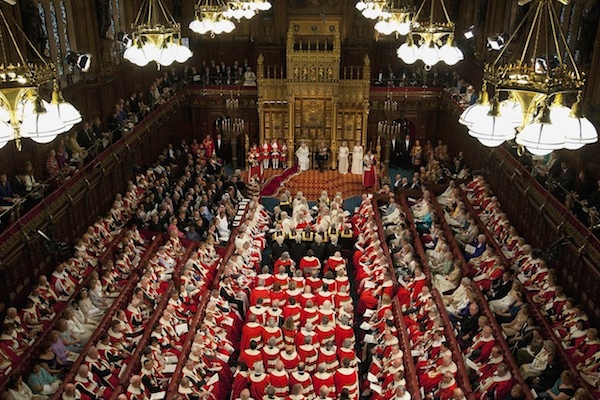There could be four troublesome votes on tax credits in the Lords this afternoon, each challenging not just the measures that George Osborne is keen to introduce, but also the way that the Lords functions.
The most troublesome of all in terms of the constitutional implications is the amendment to the motion introducing the instrument from Baroness Manzoor. This is the Lib Dem ‘fatal’ motion and it changes the government motion ‘that the draft Regulations laid before the House on 7 September be approved’ to ‘that this House declines to approve the draft Regulations laid before the House on 7 September’.
The Lib Dems want to appear to be tougher than Labour on the tax credit cuts, and they also don’t care about the constitutional crisis that the motion could trigger, whereby the Tories would have to go ahead with their threat to flood the Upper Chamber with more peers in order to get the motion through. This would look dreadful to anyone on the outside who is already struggling with the point of an unelected Chamber that seems increasingly to be stuffed with people who once did a good job for someone in Whitehall or who is a good chum of someone else in Westminster. And thus it works very well for the Lib Dems to make the Lords look ridiculous: they already think it is and would like to make the case to the wider public for its abolition as an elected chamber.
But the most troublesome motion in terms of tax credits is that tabled by Labour’s Baroness Hollis, which changes the motion to say the following:
‘this House declines to consider the draft Regulations laid before the House on 7 September until the Government, (1) following consultation have reported to Parliament a scheme for full transitional protection for a minimum of three years for all low-income families and individuals currently receiving tax credits before 5 April 2016, such transitional protection to be renewable after three years with parliamentary approval, and (2) have laid a report before the House, detailing their response to the analysis of the draft Regulations by the Institute for Fiscal Studies, and considering possible mitigating action.’
Peers who quite like the House of Lords may find this easier to support, although it still causes significant trouble for Osborne as it forces him to try to push the whole instrument through Parliament all over again, or to U-turn on the policy, and not on his own terms. The phrase ‘listening mode’ is being used by his colleagues to suggest he might ameliorate the policy, but this would be at a time of the Chancellor’s choosing, not after embarrassing votes in the Lords. And the government is still arguing that it is a financial matter, even though ministers chose to make the tax credit cuts a statutory instrument rather than part of a Finance Bill which the Lords definitely doesn’t block.
Therefore those behind the Hollis amendment are still not confident that their more reasonable attempt to stop the cuts will succeed. A senior Labour source tells me that ‘we’re not as confident as we’d expect to be because of the sabre-rattling around the constitution, and we do not know the impact that this has had on the progressive cross benchers that might support this normally.’
It might be that those progressive peers who would normally back a motion like this could be sufficiently frightened by the government threats that they end up voting down the Hollis amendment and others.
But even if the government gets its way on the instrument in the Lords, the row outside Parliament seems to have got so big now that it will be impossible for Osborne not to announce some sort of amelioration. Even if the Commons and Lords don’t exercise power to stop the cuts, other forces are now at work that are causing the Chancellor sufficient problems to make him turn ‘listening mode’ on.







Comments